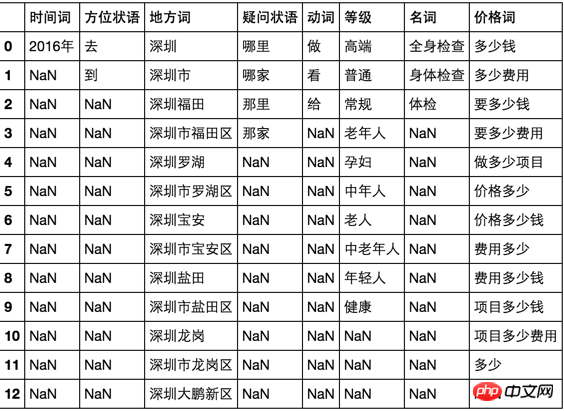结构数据是这样的:

要求按照这样的公式:组合一: 时间词+地方词+动词+等级+名词+价格词;
比如
2016年深圳大鹏新区给健康全身检查要多少钱
就是按照这样的公式组合出来的关键词
那么有什么办法用最短的办法来实现,我下面是我的算法,用pandas的算法:
for times in df[df["时间词"].notnull()]["时间词"]:
for area in df[df["地方词"].notnull()]["地方词"]:
for dong in df[df["动词"].notnull()]["动词"]:
for leave in df[df["等级"].notnull()]["等级"]:
for name in df[df["名词"].notnull()]["名词"]:
for price in df[df["价格词"].notnull()]["价格词"]:
data = (times+area+dong+leave+name+price)但是这样的代码太不优雅,而且封装成函数太难~
我想要的效果是这样的:
比如:
我写一个公式
cols = ["时间词","地方词","动词","等级","名词","价格词"]
#或则是
cols = ["地方词","动词","等级","名词","价格词"]然后把这个列表传入一个函数中,就可以得出我上面的效果~
这个要如何实现?
补充一下,如果看不懂提问的人可以这样理解这个题目
我有3个列表:
a = ["1","2","3","4","5"]
b = ["a","b","c"]
c = ["A","B"]我要这样的组合: a中的每个元素和b,c中的每个元素都进行组合
这个一个很简单的多重循环就可以解决:
for A in a:
for B in b:
for C in c:
print (A+B+C)这当然很简单,但是假如我有10000个这样的列表要重组?
难不成要手工复制黏贴每个循环10000次?这显然不太现实
在python中有没有比较好的函数或是比较好的方法来实现这个东西?
Taku的解答.完全符合需求附上我修改后的代码
import itertools
def zuhe(cols):
b = pd.Series()
for col in cols:
b = b.append(pd.Series({col:list(df[df[col].notnull()][col])}))
for x in itertools.product(*(b.values)):
print (x)
zuhe(cols = ["时间词","地方词","动词"])只需要传入需要组合的列表词,就可以得到结果!!
Try itertools
Haha, it’s actually a question of finding the Cartesian product
You must learn to organize keywords and make good use of search
I’ll perform Reinvent the wheel:
A version using iteration:
A recursive version:
Test:
Result:
Life is short, don’t do the same thing stupidly...
Questions I answered: Python-QA
Similar to
全排列生成算法You can use recursion or recursion
Recursion is relatively simple to implement, while recursion is a little more troublesome
Is list generation okay?
It is indeed possible to write recursion, but don’t you know how to write dfs depth-first search?